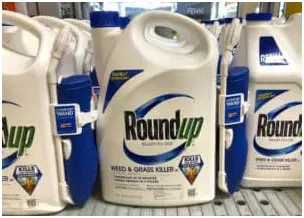Monsanto Roundup Causes Non-Hodgkin’s Lymphoma
Roundup, a weed killer used by gardeners, landscapers, and farmers alike has been found to cause cancer. In 2015, the World Health Organization’s International Agency for Research on Cancer announced its findings that glyphosate-based herbicides, the most popular of which is Roundup, are “probable” carcinogens. Roundup cancer includes non-Hodgkin lymphoma, multiple myeloma, and leukemia.
Roundup has been in wide use in home and commercial settings throughout the United States since the product was first released by Monsanto for sale in 1974. Believing it was safe, many Americans have inadvertently exposed themselves to the Roundup cancer risk at no fault of their own.
Monsanto Roundup Lawsuits
Monsanto invented the herbicide glyphosate and brought it to market under the trade name Roundup in 1974, after DDT was banned. But it wasn’t until the late 1990s that the use of Roundup surged, thanks to Monsanto’s ingenious marketing strategy. The strategy? Genetically engineer seeds to grow food crops that could tolerate high doses of Roundup. With the introduction of these new GE seeds, farmers could now easily control weeds on their corn, soy, cotton, canola, sugar beets and alfalfa crops—crops that thrived while the weeds around them were wiped out by Roundup.
In the nearly 20 years of intensifying exposure, scientists have been documenting the health consequences of Roundup and glyphosate in our food, in the water we drink, in the air we breathe and where our children play.
Eager to sell more of its flagship herbicide, Monsanto also encouraged farmers to use Roundup as a dessicant, to dry out all of their crops so they could harvest them faster. Today, Roundup is routinely sprayed on a host of non-GMO crops, including wheat, barley, oats, canola, flax, peas, lentils, soybeans, dry beans and sugar cane.
Litigation documents show that Monsanto created fake data and attacked legitimate studies exposing the dangers of Roundup, and created a campaign of misinformation to convince government agencies, farmers, and the general population that its herbicide was safe. The documents even show that Monsanto colluded with the EPA to refute the connection between Roundup and cancer.
Monsanto Roundup Risks and Side Effects
Non-Hodgkin lymphoma, sometimes referred to as NHL, is a type of cancer that starts in cells known as lymphocytes. These are a part of the immune system and are found in lymphnodes, the spleen and bone marrow.
Treatment of cancer from Roundup exposure may result in the need for harsh and debilitating procedures, such as chemotherapy, immunotherapy, radiation treatment and stem cell transplants. Rare cases sometimes require surgery.
Individuals who have been exposed to the herbicide and diagnosed with a diverse group of lymphomas, including:
- B-Cell Lymphoma
- Follicular Lymphoma
- Chronic Lymphocytic Leukema/Small Lymphocytic Lymphoma
- Mantle Cell Lymphoma
- Marginal Zone B-Cell Lymphomas
- Burkitt Lymphoma
- Primary Central Nervous System (CNS) Lymphomas
- Other health problems linked to Monsanto Roundup
Monsanto Roundup Warnings and Recalls
There has not been a recall of Roundup as a result of its link to cancer.
In fact, the Environmental Protection Agency (EPA) has taken the position that Roundup has no “meaningful risks” to human health, and that it does not cause cancer (https://src.bna.com/eAi). However, internal documents discovered during national litigation show Monsanto was colluding with the EPA and scientists for decades to create studies refuting a link between the use of glyphosate and non-Hodgkin lymphoma.

In May 2015, the World Health Organization’s (WHO) International Agency for Research on Cancer (IARC) issued a warning about the link between Roundup and cancer (https://www.who.int/bulletin/volumes/90/7/12-010712/en/) providing data on a number of studies linking exposure to glyphosate to non-Hodgkin lymphoma.
In March 2017, the State of California became the first governmental entity in the United States to declare glyphosate, the active ingredient in Roundup, to be a known carcinogen
Monsanto Roundup Lawsuit Settlements
As of this time, there have been no large mass tort settlements involving Roundup and the potential link to cancer.
Generally, large groups of settlements do not occur until such time as a few lawsuits are tried before a jury, and the manufacturer is able to more thoroughly understand its financial risk.
However, there are currently 660 lawsuits and approximately 10,000 claims (https://usrtk.org/monsanto-papers/) pending against Monsanto for injuries caused by exposure to Roundup.
The first bellwether trial involving an individual diagnosed with non-Hodgkin’s lymphoma (DeWayne Johnson v. Monsanto) resulted in a $289 million jury verdict against Monsanto in August 2018.
The Russo Firm and Monsanto Roundup Lawsuits
The Russo Firm is currently investigating non-Hodgkin’s lymphoma lawsuits for individuals throughout the United States who may be entitled to financial compensation as a result of Monsanto’s failure to adequately warn about the risk of cancer associated with Roundup side effects.
Contact Our Experienced Monsanto Roundup Lawyers For A Free Case Evaluation
If you or a loved one have suffered an injury from exposure to Monsanto Roundup, call The Russo Firm at 844-847-8300 or contact us online to talk with an experienced lawyer about your injuries. If you can’t travel to our office, we will come to you, or we can work by phone, fax, email or other methods of communication. Remember, you pay no fee unless we obtain compensation for you.
